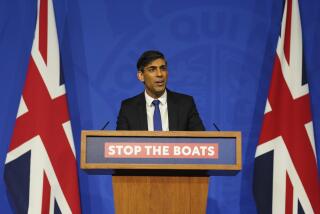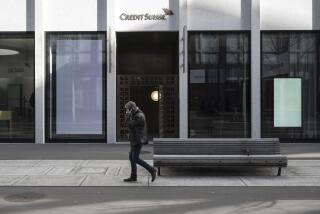Bailout has a British accent
- Share via
LONDON — Britain’s announcement of an $87-billion bailout of its flailing banking system boosted confidence in the nation’s financial sector Wednesday but didn’t immediately alleviate the panic gripping investors.
The unveiling of the rescue package sent shares soaring for beleaguered financial institutions such as the Royal Bank of Scotland and HBOS, whose stocks had taken major hits in the preceding days.
But the surge among bank stocks, along with a sooner-than-expected interest rate cut by the Bank of England, was not enough to prevent the London stock exchange from dropping 5%. Since Monday, the FTSE 100 index has shed 12% in value, hitting a low not seen in four years.
Although officials worked feverishly through the night to finalize the package in time to unveil it before the start of trading Wednesday, the British government insisted that the strength of the bailout plan would not be measured by the stock market’s performance.
Prime Minister Gordon Brown characterized the package as a groundbreaking effort to help banks stabilize their balance sheets. Several times during a news conference, Brown and his top economic minister, Alistair Darling, took pains to point out that the plan differed significantly from the $700-billion U.S. bailout approved by Washington last week.
Whereas the U.S. government is buying securities tied to troubled home loans, the British government will give banks a transfusion of as much as $87 billion in exchange for special shares that, if the banks recover, would give taxpayers first dibs on profits. (U.S. officials say American taxpayers, too, could earn a return if the government can later sell the securities it buys.)
British officials also established a separate liquidity fund of at least $348 billion that would offer short-term loans to financial institutions to help them cover their day-to-day operations.
“This is not a time for conventional thinking or outdated dogma but for the fresh and innovative intervention that gets to the heart of the problem,” Brown, a former British treasury chief, told reporters. “This is not the American plan. We are buying shares in the banks themselves. . . . That is capital that we are putting in, but we expect a return on that.”
Later, the Bank of England cut its benchmark interest rate by half a percentage point to 4.5%, a day earlier than expected. The reduction was part of a concerted lowering of rates by central banks worldwide, including the U.S. Federal Reserve.
Despite the move, stocks fell throughout Europe. Both the Paris and Frankfurt bourses plummeted about 6%. Russia suspended trading on its Micex index for two days after shares dropped precipitously Wednesday morning.
The pressure on European governments to act to save their banks grew enormously this week after Monday’s rout of global stocks.
On Tuesday, Spain said it would spend as much as $68 billion to buy bank assets. France said Wednesday that it, too, would take stakes in banks if necessary to rescue them from bankruptcy, and Italy hinted that it might follow in Britain’s footsteps with a similar bailout package.
Although British banks have not been so implicated in the subprime mortgage debacle as their U.S. counterparts, they too have spent years issuing easy credit and are now finding it difficult to recover their money. Banking regulation in Britain is also light by European standards.
Analysts and banking executives generally lauded the British plan, which will, in effect, mean that some of the country’s biggest banks, including Barclays and Lloyds TSB, will be partially nationalized.
In return for the infusion of capital, the British government will demand not just “preference shares” in the banks but will also require that the banks show “full commitment to support lending to small businesses and home buyers.” Also, the government said it would examine the controversial issue of executive pay.
But the problem, some analysts say, is that no one can say with certainty just what it will take to dispel investors’ worries and ease the paralysis of banks that refuse to lend to one another for fear of not getting their money back.
“What they’ve proposed is really reasonable. But is it enough? Nobody really knows,” said M.A.H. Dempster, emeritus professor at the Judge Business School at Cambridge University. “The markets are in total panic now.”
Dempster and others advocate further cuts in the interest rate to stimulate the economy, but the prospects of that are unlikely, at least for the time being.
Some criticism of the government bailout plan came from Brown’s own Labor Party.
“This is simply subsidizing a number of banks and paying off their bad debts,” John McConnell, a Labor member of Parliament, told the British Broadcasting Corp. “What we’re doing now is propping up the system. It’s like your next-door neighbor having a party . . . and sending you the bill.”
--
More to Read
Sign up for Essential California
The most important California stories and recommendations in your inbox every morning.
You may occasionally receive promotional content from the Los Angeles Times.














